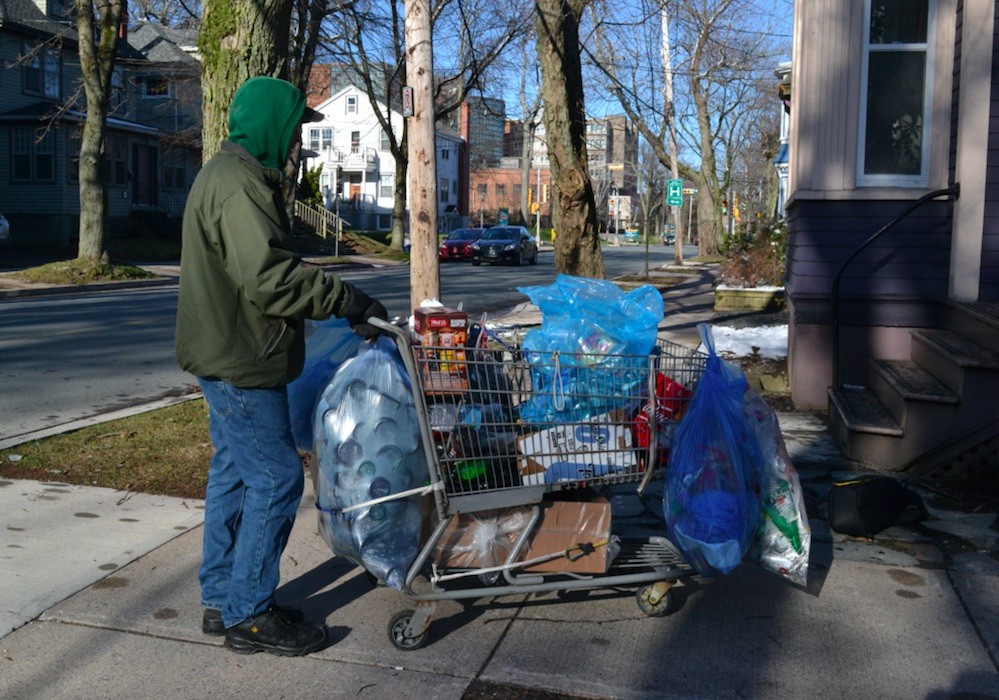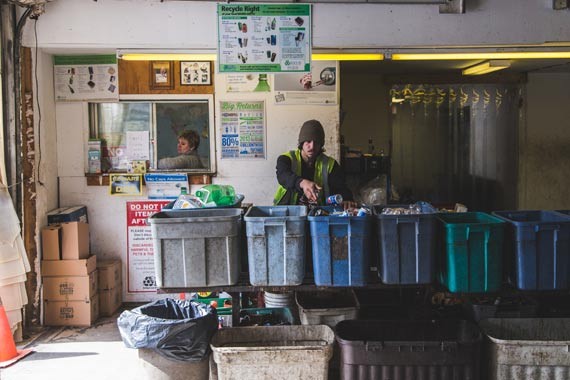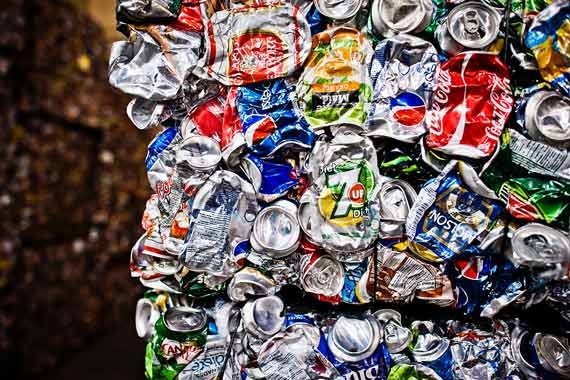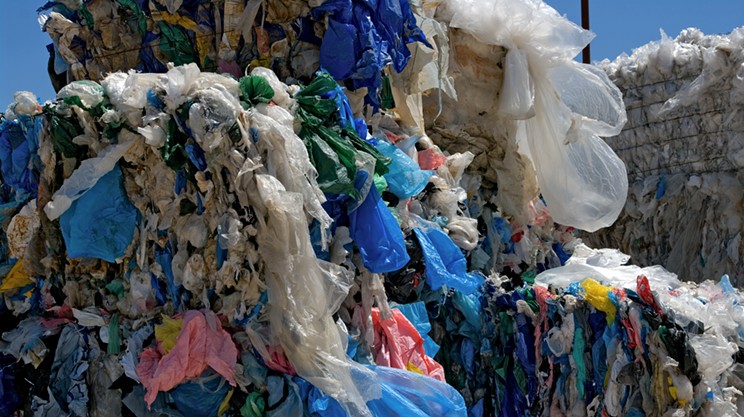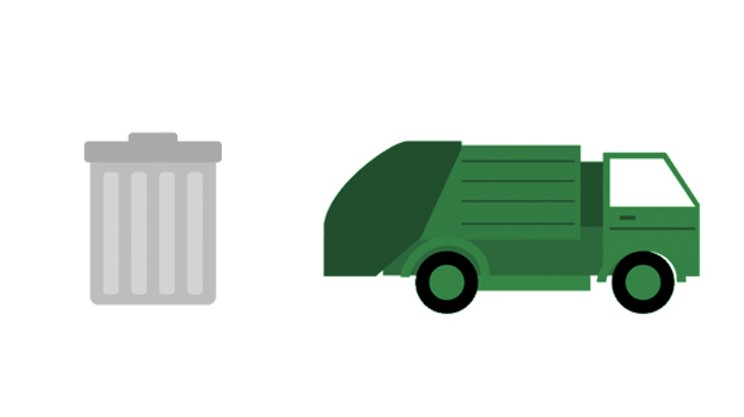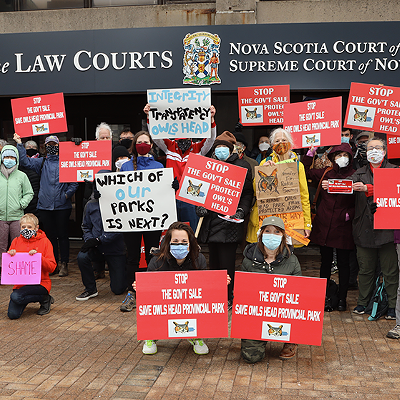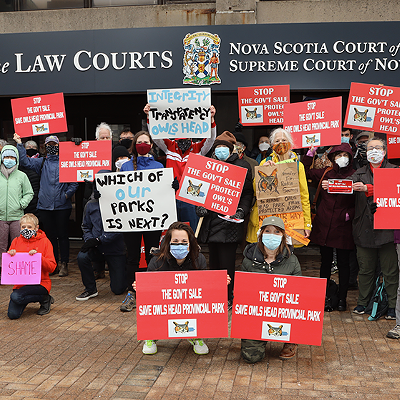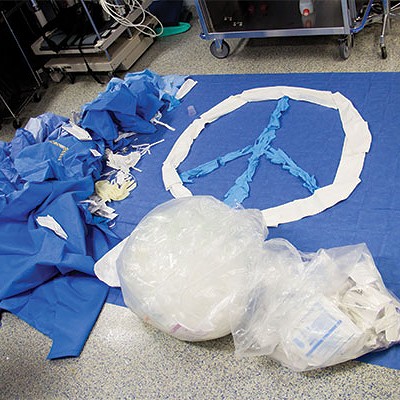It’s Sunday, the evening before collection day in south end Halifax. Outside the houses on Edward Street, tidy mounds of rubbish decorate the curb: plastic bags of recycling, trash and what appear to be loose remnants of spring cleaning. And there are, of course, plenty of empty beer cans—evidence of a boozy weekend.
These aluminum cans are so common, so flimsy, it’s easy to forget they’re a durable technological wonder from the ’60s, still going strong. Each can has gone through a lot to get to this curb, arriving here on Edward Street full of promise only to be used up and thrown away with the garbage.
The owner of those freshly emptied cans will follow some measure of processing to abide by municipal recycling rules—only tossing away those that are rinsed, not crushed and separated from plastic bags, paper and corrugated cardboard. Or not, depending on the individual’s laziness level. In any case, that can is probably going to end up in a blue bag, placed neatly outside and forgotten.
But what happen to it after that? The cans Haligonians leave at the curb might be picked up by residential garbage collectors, as city hall intends. However, there’s also a good chance they’ll be found by someone else.
Sunday on Edward Street, Greg is slowly pushing his cart along. He glances at some blue plastic bags outside a house. No refundables appear to be inside. He ignores them and continues on toward Jubilee Road.
“It’s a little slow today, but other than that it’s good,” says Greg, an after-market entrepreneur who doesn’t give his last name. He’s been a regular collector of other people’s recyclables for about two and a half years.
Today, among other things, his cart contains a box of empty Mill Street beer bottles along with a box of Budweiser. A bag with several cans of Somersby blackberry cider hangs off the edge. Standard beer cans pay five cents each when they’re refunded—half the 10-cent deposit you’re paying on them in the store—while the bottles are each worth a dime.
Greg speaks quickly, with a warm smile of crooked teeth. He looks to be in his late 40s or early 50s. He says he’s usually out collecting recyclables two or three times a week, “depending on how the bottle situation is.” Today is his first day out collecting after a six-day break.
For people struggling with finances or living on the street, collecting recyclables and bringing them to a depot can make all the difference in disposable income. Greg says he’s currently on income assistance due to a neck problem, but it isn’t enough.
“It doesn’t give too much benefit,” he says about his IA. “So anyway, collecting is what I gotta do to keep going here.” According to HRM’s Solid Waste and Resource bylaw, no person shall “collect waste material placed for municipal collection.” Spokesperson Tiffany Chase confirms that anyone who goes around collecting recyclables from other properties is breaking the law. The penalty for an infraction is a $352.50 ticket. But enforcement is complaint-driven, and not a lot of people seem to be complaining. Halifax police confirm no fines have been issued in the last five years.
The couple of folks who pass Greg by don’t pay him much attention. Someone rolling a shopping cart along, collecting cans in the early morning, isn’t an unusual sight in peninsula neighbourhoods. Greg says the residents of homes where he usually gets his recycling aren’t phased by his efforts and are often friendly.
“They don’t really say a whole lot. Once they see a person pushing a cart, they’ll bring out their recyclables to you,” he explains. “There are some good people like that.”
That’s if the collector has a cart. Greg says he sees a lot more people these days using cars to drive around and pick up blue bags.
“They’re pretty much cutting us guys off.”
Looking at Greg’s stuffed cart, and the money he’s set to make, an obvious question follows: If taking beverage containers to a depot can get you some extra cash, why doesn’t everyone do it? The effort involved, for one. Or maybe you think someone else needs those dimes and nickels more. But plenty of folks are collecting recyclables for reasons that don’t come down to necessity.
“I’m not doing this for me personally,” says Margaret Munroe, handing her bags to staff at Tanner’s Transfer enviro-depot in north end Halifax. “I’m doing it for social events at the condo I live in...so we just charge the residents a minimal amount.”
On a foggy Monday morning, it’s a slow time at Tanner’s. Stepping inside the depot, there’s a stack of empty Labatt Blue boxes to the left of the door. Workers in reflective vests mill about, taking bags of recyclables off the hands of customers. The walls are lined with posters instructing visitors on what the depot can and can’t accept: no milk containers, and other beverage containers must have caps removed. It’s slow in terms of drop-offs, but far from quiet. The sound of aluminum, glass and plastic clanking together can be heard throughout the building as staff sort through containers with impressive speed.
“You see all kinds here,” says Annette Martin of Tanner’s customers. The family-run recycling facility has been open since 1996. Martin, the daughter of depot owner Art Tanner, has been working here for 11 years.
“For the most part, people come in on a weekly basis and they normally have one to three bags,” she says.
The flow of business is largely dependent on the weather. Christmastime and the holidays can be busy, but the real rush of recyclables comes in during the summer months.
“The better the weather, the better business we have,” says Martin. “Summertime, it’s more consistent and you’re busier because people drink more.”
Some of the people arriving with blue bags at Tanner’s have probably been out collecting from city streets, like Greg. (Though he says he prefers taking his haul to the Youth Live depot on Mitchell Street: “It’s closer to where I live.”)
Others are just looking to make back some of that deposit they had to pay when buying cans and bottles in the first place—like Joe, for example. Joe also didn’t want to use his last name—that appears to be a trend when it comes to people earning money from bottle collection. Joe drives down to Tanner’s every once in awhile to clear away the blue bags cluttering up his house. Today he made six bucks.
“You pay a deposit when you buy, so you’re recouping some of the money you gave up,” he says. “A five-dollar bill is as good to me as it is to somebody on the street.”
Not everyone keeps the money in their own pocket, though. Recyclers can also request their refund go to charity—Christmas Daddies and the IWK receive money from depots like Tanner’s. The facility also recycles leftover paint and electronics from as many customers as it can process.
Martin says the company motto is “Get them in, get them out.” She doesn’t want anyone waiting for their money more than five minutes, if it can be helped.
Cans get counted quickly when they’re passing through the hands of Tanner’s experienced workers.
“We have guys that have been here 10 years,” says Martin. “I gotta say, knock on wood, we have pretty low turnover.”
Every now and then, those staffers will come across something a little more valuable than a blue bag full of cans. Lost video games and the like.
“There have been instances where the boys will find something on the table,” she says, “and I’m like, ‘You might want this back.’”
Once the cans are properly sorted, it’s time for them to move into another set of hands. That’s where Nova Scotia’s Resource Recovery Fund Board comes in. Trucks arrive at the depots to pick up the various recyclable materials and transport them across the province. Aluminum will either go in a standard trailer truck—capable of holding 78 bags—or a compaction trailer that can hold 300 and crushes the aluminum right on the truck using an auger system.
“First of its kind in the world,” says Jeff MacCallum, CEO of RRFB.
Over 320 million beverage containers were recycled in 2013 from Nova Scotia’s 80 enviro depots, 20 of which are in Halifax.
MacCallum says the refundable beverage containers program leads to an 80 percent return rate across all materials.
“If you look at aluminum, or some of the materials independently, it’s even higher,” he says. “The return rates in a lot of those curbside programs tend to be a lot lower. A lot of the material, I think, ends up potentially in the landfills or not recycled.”
Once on the trucks, the recyclables go to different locations based on their materials. Plastic goes to NovaPet Inc. in Amherst, where it’s ground up into flakes. Those flakes are then shipped all the way to NovaPet’s parent company, UltraPET, in Albany, New York. There it’s melted down and either turned back into bottles or repurposed as car floor mats, egg cartons or even office furniture.
Glass goes to Rayan in New Brunswick, where it’s crushed into cullet and remade into bottles or fibreglass.
All those cans of aluminum first take a road trip to Kemptown. There, they find a temporary home at the RRFB Nova Scotia Processing Centre. The cans are unloaded loose, put on a conveyer and sent into a baler. The result is a large rectangular prism.
“They have to be a certain size and weight,” MacCallum says. “We’re not allowed to have contamination—too much of other plastics, papers or fibres—and not too much moisture.”
The crushed cube then journeys to any number of aluminum recycling plants owned by Novelis Inc.—from Oswego, New York to as far away as Greensboro, Georgia. Headquartered in Atlanta, Novelis is a spin-off of former Montreal aluminum manufacturer Alcan Inc. It’s now a subsidiary of Indian multinational Aditya Birla, which purchased Novelis in 2007 for a reported $6 billion. Here in these American factories the can you put outside on your curb is finally melted down and recycled.
“The cost of making a new can out of recycled aluminum saves over 90 percent of the cost compared to making it from raw aluminum bauxite,” says MacCallum. “Most of that saving is from energy costs.”
The aluminum is then repurposed and brought back to life as another can. Novelis works with both Coca-Cola and Anheuser-Busch, so it’s possible that discarded Oland’s on the curb will be reunited with your fridge as a Bud Light.
Whatever the brand, if that new can makes it to Halifax, it’ll eventually end up back in the blue bag, waiting to be picked up off the street. Waiting for someone like Greg. Someone like Ray.
Ray also won’t give his last name. He says he’s been collecting recyclables for six years. The telltale sound of his shopping cart rolling along, with cans and bottles clanking against metal, can be heard a couple of streets over as he makes his way down Henry Street.
He’s often on the same south end streets as Greg. Usually, he explains, it’s first-come, first-served when it comes to picking up the blue bags. However, Ray occasionally comes across people who are “territorial.”
Ray says he isn’t homeless, but he’s pretty close.
“I stay at a friend’s place in Dartmouth for a couple days, then I go to a friend’s place in the south end,” he says, “back and forth between the two places.”
As for the money, it depends on what people are putting out at the curb. “There’s times when it’s good,” he says, “there’s times when it’s not.”
It looks like it may have been a good evening’s work for Ray. His cart has two bags hanging off each side, with more bags and recyclables piled inside. Even with a full cart, he won’t know for sure how much money it’s worth until he takes it to the depot.
An empty bottle of Big 8 cola sits in the middle of the cart, slightly crushed. The depot may not take it, but it’s an acceptable risk. Rejection is one of the lesser perils a recycling entrepreneur has to face. Ray will either be up an extra nickel, or out a tiny bit of added cart-pushing effort. At the very least the bottle has theoretical value—proof that there may be limits to the idea that one person’s trash is another person’s treasure.
All the hands this discarded scrap will pass through on its way to be repurposed, all the activity a simple piece of refuse creates, all of it starts here with Ray, pushing his can cacophony down the street.
On this Sunday evening, he’s the only one out on Henry. The chilly weather is keeping away the competition.
“They’re scared to death of getting frostbite on their fingertips,” he says. Ray isn’t deterred by the cold himself. “I come out anyway. If I can get out, I’m out.”
Rebecca Dingwell is a freelance journalist and diligent can and bottle washer.

